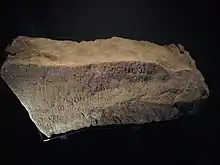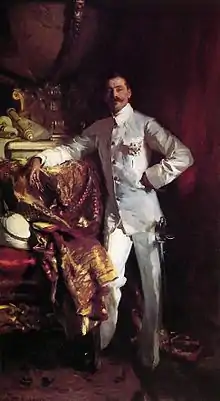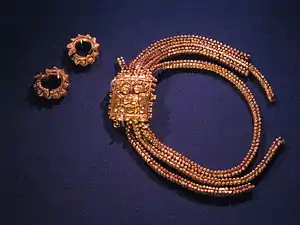National Treasures of Singapore
The national treasures of Singapore are artifacts deemed to have significant historical importance to the country of Singapore.
List
Below is a list of artifacts considered to be National Treasures by the National Museum of Singapore.
| S/N | Name | Description | Year | Image | Ref |
|---|---|---|---|---|---|
| 1 | Singapore Stone | The Singapore Stone is a fragment of a large sandstone slab which originally stood at the mouth of the Singapore River, believed to date back to at least the 13th century and possibly as earlier. | Unknown |  |
[1][2] |
| 2 | Portrait of Sir Frank Athelstane Swettenham | Portrait of the first Resident General of the Federated Malay States, by John Singer Sargent | 1904 |  |
[1][2] |
| 3 | Last will and testament of Munshi Abdullah | Munshi Abdullah is widely considered as the father of modern Malay literature and was scribe and copyist for Sir Stamford Raffles. | 1854 | [1] | |
| 4 | Mace of the City of Singapore | Chinese philanthropist Loke Wan Tho in conjunction with King George VI granting Singapore a Royal Charter in 1951 | 1951 | [1] | |
| 5 | Daguerreotype view from Fort Canning Hill | By French customs service officer Alphonse-Eugene Jules | 1844 | [1] | |
| 6 | Gold armlets and rings from Fort Canning | East Javanese style, found at Fort Canning Hill | 1928 |  |
[1] |
| 7 | Portrait of Sir Stamford Raffles | Portrait of the founder of Singapore by noted painter Xu Beihong | 1939 | [1] | |
| 8 | Natural history drawings of flora and fauna | Collection of 477 drawings commissioned by William Farquhar | 19th century | .jpg.webp) |
[1] |
| 9 | A wooden hearse | Used for the funeral of Chinese philanthropist Tan Jiak Kim | 1917 | [1] | |
| 10 | Embroidered Chinese coffin cover | One of the largest of its kind in existence in Singapore | unknown | [1] | |
| 11 | A glove puppet stage | Belonging to the Fujian puppet troupe, Xin Sai Le | 1930s | [1] | |
References
- Lim, Wei Chean (31 January 2006). "Singapore's Treasures". The Straits Times. Items listed as national treasures of Singapore are: (1) a fragment of a 13th century sandstone slab bearing an undeciphered inscription known as the Singapore Stone; (2) a 1904 portrait of Sir Frank Athelstane Swettenham, the first Resident General of the Federated Malay States, by John Singer Sargent; (3) the last will and testament of Munshi Abdullah, the father of modern Malay literature; (4) the mace of the City of Singapore (1953) that was presented by Chinese philanthropist Loke Wan Tho in conjunction with King George VI granting Singapore a Royal Charter in 1951, raising its status to a city; (5) an 1844 daguerreotype of the view from Fort Canning Hill by French customs service officer Alphonse-Eugene Jules, one of the earliest photographic images of Singapore; (6) 14th-century gold armlets and rings in East Javanese style, found at Fort Canning Hill in 1928; (7) a 1939 portrait of Sir Shenton Thomas, the last Governor of the Straits Settlements, by painter Xu Beihong; (8) a collection of 477 natural history drawings of flora and fauna in Melaka commissioned by Resident of Singapore William Farquhar in the 19th century; (9) a wooden hearse used for the funeral of Chinese philanthropist Tan Jiak Kim in 1917; (10) an early 20th-century embroidered Chinese coffin cover, one of the largest of its kind in existence in Singapore; and (11) a glove puppet stage belonging to the Fujian puppet troupe, Xin Sai Le, which came to Singapore in the 1930s.
- "Our Top Twelve Artefacts". National Heritage Board. Archived from the original on 14 June 2007. Retrieved 17 July 2007.
This article is issued from Wikipedia. The text is licensed under Creative Commons - Attribution - Sharealike. Additional terms may apply for the media files.